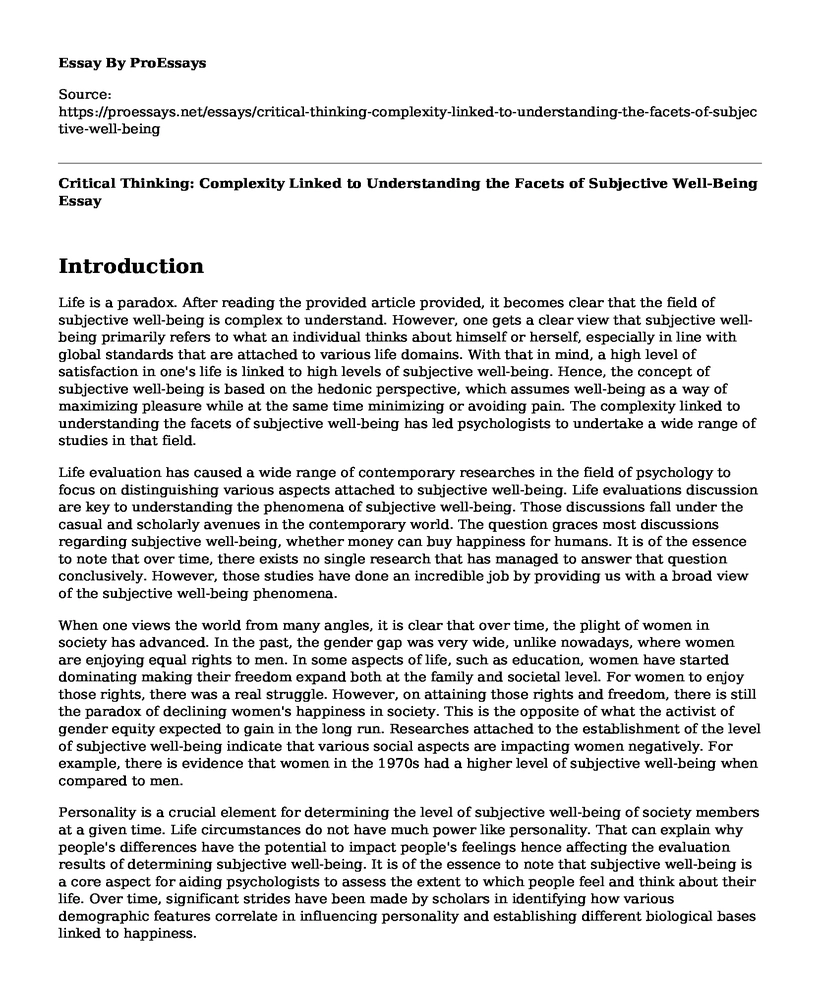Introduction
Life is a paradox. After reading the provided article provided, it becomes clear that the field of subjective well-being is complex to understand. However, one gets a clear view that subjective well-being primarily refers to what an individual thinks about himself or herself, especially in line with global standards that are attached to various life domains. With that in mind, a high level of satisfaction in one's life is linked to high levels of subjective well-being. Hence, the concept of subjective well-being is based on the hedonic perspective, which assumes well-being as a way of maximizing pleasure while at the same time minimizing or avoiding pain. The complexity linked to understanding the facets of subjective well-being has led psychologists to undertake a wide range of studies in that field.
Life evaluation has caused a wide range of contemporary researches in the field of psychology to focus on distinguishing various aspects attached to subjective well-being. Life evaluations discussion are key to understanding the phenomena of subjective well-being. Those discussions fall under the casual and scholarly avenues in the contemporary world. The question graces most discussions regarding subjective well-being, whether money can buy happiness for humans. It is of the essence to note that over time, there exists no single research that has managed to answer that question conclusively. However, those studies have done an incredible job by providing us with a broad view of the subjective well-being phenomena.
When one views the world from many angles, it is clear that over time, the plight of women in society has advanced. In the past, the gender gap was very wide, unlike nowadays, where women are enjoying equal rights to men. In some aspects of life, such as education, women have started dominating making their freedom expand both at the family and societal level. For women to enjoy those rights, there was a real struggle. However, on attaining those rights and freedom, there is still the paradox of declining women's happiness in society. This is the opposite of what the activist of gender equity expected to gain in the long run. Researches attached to the establishment of the level of subjective well-being indicate that various social aspects are impacting women negatively. For example, there is evidence that women in the 1970s had a higher level of subjective well-being when compared to men.
Personality is a crucial element for determining the level of subjective well-being of society members at a given time. Life circumstances do not have much power like personality. That can explain why people's differences have the potential to impact people's feelings hence affecting the evaluation results of determining subjective well-being. It is of the essence to note that subjective well-being is a core aspect for aiding psychologists to assess the extent to which people feel and think about their life. Over time, significant strides have been made by scholars in identifying how various demographic features correlate in influencing personality and establishing different biological bases linked to happiness.
Conclusion
In conclusion, the complexity linked to understanding the facets of subjective well-being has led catalyzed psychologists to undertake a wide range of studies in that field. All those studies have played a critical role in unraveling the phenomena under review. Besides, some research has been undertaken based on the works of various credible ancient philosophers.
References
Diener, E., & Lucas, R. E. (1999). 11 personality and subjective well-being. Well-being: Foundations of hedonic psychology, 213.
Diener, E., Tay, L., & Myers, D. G. (2011). The religion paradox: If religion makes people happy, why are so many dropping out?. Journal of personality and social psychology, 101(6), 1278.
Kahneman, D., & Deaton, A. (2010). High income improves the evaluation of life but not emotional well-being. Proceedings of the national academy of sciences, 107(38), 16489-16493.
Steger, M. F., Kashdan, T. B., & Oishi, S. (2008). Being good by doing good: Daily eudaimonic activity and well-being. Journal of Research in Personality, 42(1), 22-42.
Stevenson, B., & Wolfers, J. (2009). The paradox of declining female happiness. American Economic Journal: Economic Policy, 1(2), 190-225.
Cite this page
Critical Thinking: Complexity Linked to Understanding the Facets of Subjective Well-Being. (2022, Mar 10). Retrieved from https://proessays.net/essays/critical-thinking-complexity-linked-to-understanding-the-facets-of-subjective-well-being
If you are the original author of this essay and no longer wish to have it published on the ProEssays website, please click below to request its removal:
- Best Practices for Student Learning Essay
- Rental Properties and Government Fight Against Same-Sex Marriage in Canada and Bermuda
- Positive School Culture - Essay Sample
- Our Lean Start-Up Assignment: How Teamwork Achieved Success - Essay Sample
- Essay Sample on Early Childhood Education: Playtime for Fun or Control?
- Essay Example on What Is Intelligence? Exploring Different Theories
- Free Essay Sample - Empowering Voices: Deaf Individuals Breaking Barriers and Shaping Communities







